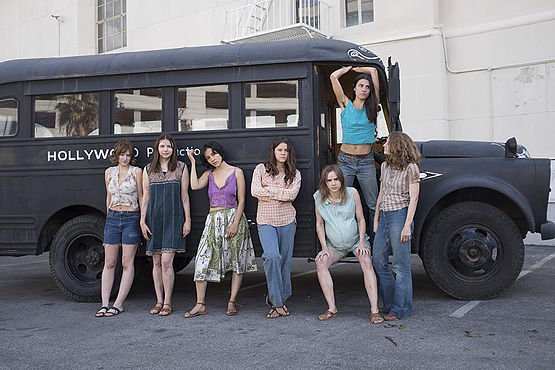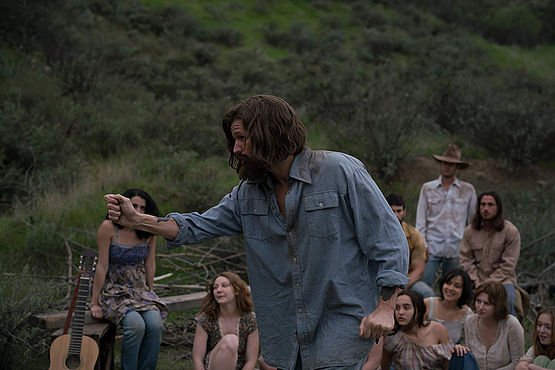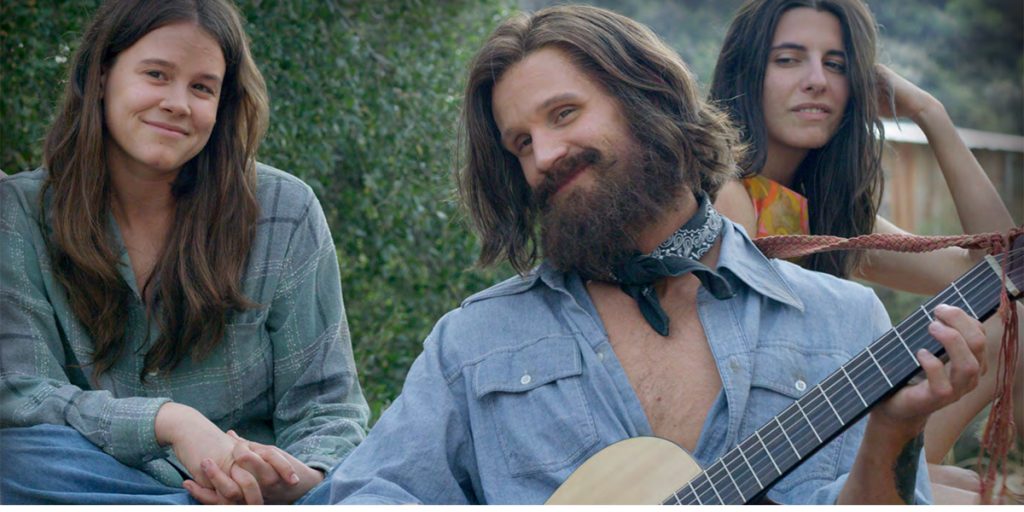Matt Smith is Charles Manson in Charlie Says, where American Psycho director Mary Harron asks all the right questions.
Much has been said about Charles Manson, his “family” of young misfits and the horrific murders that have been committed in his name. From crime books, biographies and sociological investigations to documentaries, detective shows and popular horror series, the cult leader’s disturbing behaviour has been analysed, written about and fictionalised in more than one way. Not only that, but there seems to be a demand for a specific kind of serial-killer show that could perhaps be defined as “intellectual”: disquieting and yet intriguing stories continue to be explored, and audiences are oddly fascinated by their clever but somewhat damaged leading characters, from Jonathan Groff’s FBI agent on a sociopathic mission in Mindhunter (2017) to James Purefoy’s Edgar Allan Poe-obsessed cult leader in The Following (2013-2015) and many more.
Whether through fiction or informative accounts, many have tackled the subject of Manson in the past, and yet it is precisely the abundance of films that have already been made on the notorious serial killer that explains why Mary Harron’s (Dalíland) take on the Manson murders stands out. Charlie Says is not another look into the serial killer’s actions and motives: the American Psycho director focuses on Manson’s girls, and the result is a thought provoking, much-needed psychological analysis that raises the right questions and is extremely relevant to our society.
Charlie Says focuses on the three young women who were first sentenced to death and eventually to life inprisonment in the Manson murder case, and is based on the girls’ real testimonies from their conversations with the graduate student who was sent to their prison to teach them. In fact, our first introduction to Manson happens through one of these girls, Leslie (Hannah Murray), who enters the community almost by chance only to confront the very same confusing situation we are presented with: as we witness the leader in action and meet the rest of the “family” through Leslie’s eyes, it is not a serial killer and his cult of horrible human beings that we see, but an an unlikely group of ordinary girls who happened to be in the wrong place at the wrong time.

As a matter of fact, the most shocking discovery is that these girls are not monsters at all: the more members of the group we meet, the more we sympathise with them and even start to like them, which is what makes it even harder to witness their transformation as they unconsciously absorb Manson’s absurd, toxic rules and beliefs and make them their own. As we watch them live by their idol’s dogma and aim to please him in every possible way, a very scary question comes to our minds: what if it had been us? Would we have been able to see through Manson’s delusions or would we have accepted them as our own?
Harron and Guinevere Turner (who co-wrote the screenplay) define Charlie Says as the story of “how seemingly good people come to do very bad things, and what happens when you give up your will to another and shut down the voice that tells you no”. It is those “seemingly good people” that draw us into Manson’s world, and all cast members have done an excellent job at portraying these extremely layered and believable characters, from the three girls in the prison – Leslie Van Houten (Hannah Murray), Patricia Krenwinkel (Sosie Bacon) and Susan Atkins (Marianne Rendón) – to the rest of the “Family” and the people they happen to meet. But much of the credit is also due to the way the character of Manson himself has been written and portrayed. Matt Smith doesn’t just look the part: he absolutely owns it.
When we first meet him, Harron’s “Charlie” is the kind of person that everybody seems to be unexplicably drawn to. Sure, there’s definitely something odd about his intense gaze and absurd demands, but for some reason you’re still weirdly intrigued by his rebellious attitude and promises of freedom. Which, of course, isn’t freedom at all: Manson’s motto might be “kill your ego”, but it is precisely his own ego that drives most of his actions, even if the girls will not realise it for a very long time. We don’t find out much about his past or what made him this kind of person, but that isn’t what the film is about: Charlie Says focuses on the girls, and seeing Manson with his followers is more than enough to make us dangerously aware of how easy it can be for a delusional but very charismatic person to mould the minds of entire groups of people without them even noticing. After all, at the very beginning of his “cult leading” days, this bearded hippie/failed musician with a volatile temper doesn’t seem capable of such violence. The switch from eccentric preacher to sociopathic, abusive maniac happens quickly and naturally, and that is the scariest part of all.

If witnessing Manson’s unstable mind in action helps us understand what led to those tragic murders in 1969, it is years later, when we listen to the girls reminisce about Charlie, that the extent of their leader’s influence on them truly sinks in. When graduate student Karlene Faith (author of “The Long Prison Journey of Leslie van Houten: Life Beyond the Cult“, the book that inspired the film) visits Leslie, Pat and Susan in prison to reabilitate them, nothing could have prepared her for the state she would find them in. She quickly realises that much of what they need to learn can’t be found in a textbook: the girls’ perception of reality itself is distorted, and not only they have no idea of the consequences of their actions, but they genuinely believe that what they did was part of a plan that couldn’t have been avoided.
The only person who has ever set a “moral example” for them was Manson, and, as a result, they are still under his spell and unable to process most of what goes on around them. Which doesn’t mean they are shy of opinions: they can’t wait to talk about the old times. Just like any other normal teenager, they are chatty and opinionated, but what’s immediately obvious is that they are also significantly damaged. “Nobody belongs to anybody here. Except Charlie. We all belong to Charlie.” Leslie calmly explains to Karlene (Merritt Wever), whose empathy and compassion soon enables her to earn their trust and enter their circle. “Every girl should have daddy like Charlie” the girl adds, with a smile, and a shiver runs down our spine.
From the moment we realise that the girls’ emotional and moral identities have been compromised, it becomes clear that a series of questions needs to be raised. It’s not even a matter of if and how one might be able to free them from Manson’s grasp and make them see him for who he really is, just like it’s not about educating them on their violent behaviour: the film invites us to dwell upon much deeper psychological issues. Is it morally right to lift the curtain from their eyes and show them what they’ve done? Once the illusion is off, could they ever manage to come to terms with their past? Can these murderers also be victims deserving of our compassion? And, most of all, can they be forgiven? Most of these questions are left for us to answer, but one thing is guaranteed: Charlie Says will surprise you, shock you, move you and make you change your mind several times. Most of all, it will make you think and it will stay with you for a long time after you’ve left the cinema.
Charlie Says is now available to watch on digital and on demand.

